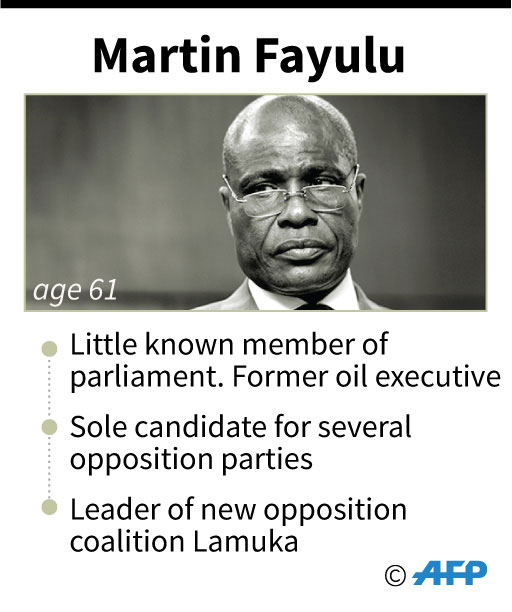
Paris, France | AFP | The runner-up in the Democratic Republic of Congo’s long-awaited presidential poll Martin Fayulu on Thursday denounced the results as an “electoral coup”.
His fellow opposition candidate Felix Tshisekedi was declared the winner of the December vote by the electoral commission early Thursday morning.
“These results have nothing to do with the truth at the ballot box,” Fayulu told Radio France International.
“It’s a real electoral coup, it’s incomprehensible.”
The Democratic Republic of Congo has been mired in political crisis for much of the rule of President Joseph Kabila, who took over in 2001 and went on to extend his mandate, sparking deadly violence.
It was hoped that elections for a new president in late December 2018 would ease the tensions, but long delays in announcing the results again stoked trouble.
On Thursday opposition candidate Tshisekedi was named by election officials as the provisional winner of the historic poll.
Here is an overview of the election delays:
– First free vote –
In January 2001, 29-year-old Kabila takes over as leader of the vast central African country just days after his father Laurent-Desire is assassinated by a bodyguard.
In 2006 he wins the first free presidential election for 41 years, defeating ex-warlord Jean-Pierre Bemba in a violence-tainted poll.
A constitutional change the same year limits a president to two five-year terms.
In March 2007 heavy clashes erupt in Kinshasa between army troops and soldiers loyal to Bemba, leaving 300 dead. With his men defeated, Bemba leaves the country but is arrested near Brussels a year later on charges of war crimes.
In November 2011, Kabila is re-elected in a vote marked by chaotic organisation, violence and alleged irregularities. The opposition rejects the results.
– Elusive election –
In January 2015, demonstrations break out in Kinshasa over a bill that would delay the 2016 elections and enable Kabila to remain in office beyond the end of his second term. Around 50 people are killed.
More demonstrations follow in September in which several dozen people are killed.
December 20, 2016 is meant to be Kabila’s last day but with no vote planned nor sign of him stepping down, protesters take to the streets prompting a crackdown that leaves at least 40 dead, the UN says.
– Polling day fixed –
On New Year’s Eve, opposition parties and the government reach a deal that the delayed elections will be held at the end of 2017 and that Kabila can stay in power until then.
But the vote is postponed again, purportedly because of organisational problems. In November 2017 the Electoral Commission announces a new date of December 23, 2018. This means Kabila would stay in office until January 2019.
The opposition demands his departure and there are more protests. The church says at least 56 people are killed at demonstrations between April and October 2017, with the police accused of using excessive force.
In June 2018 the International Criminal Court acquits Bemba of war crimes and he returns home announcing he will run for president.
Two months later Kabila names former interior minister Emmanuel Ramazani Shadary as his successor, ending speculation about his own candidacy.
When the Electoral Commission publishes its list of 21 approved candidates in September, it excludes Bemba and exiled regional baron Moise Katumbi, both of them opposition heavyweights.
– More delays –
After a warehouse fire destroys electronic equipment needed to stage the election in the capital Kinshasa, the electoral commission on December 20 says it will postpone the vote for seven days.
A new date is set for December 30; four days before, authorities announce the elections will be postponed to March in two regions troubled by violence.
On the eve of the elections and with tensions rising, two opposition frontrunners — Martin Fayulu and Felix Tshisekedi — reject a proposed pledge aimed at averting post-election violence.
– Results held up –
Voting on December 30 takes place in “relative calm”, although there are reports of clashes in the volatile eastern South-Kivu province that claim several lives.
The following day, as counting begins, the government suspends internet services to avert a “popular uprising”.
On January 2 it pulls accreditation for a French radio journalist and cuts off the station’s broadcasts.
The next day the election commission says logistical problems may force it to postpone publication of provisional results. It later confirms the delay.
As patience wears thin and international pressure mounts for the results to be revealed, opposition candidates warn authorities not to “disguise the truth of the polls”.
 The Independent Uganda: You get the Truth we Pay the Price
The Independent Uganda: You get the Truth we Pay the Price



